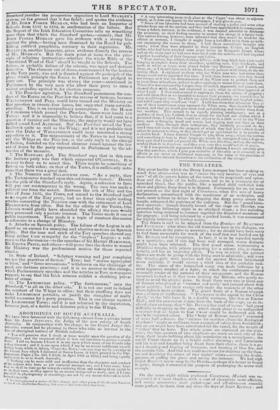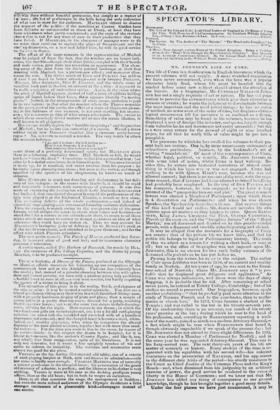On the same night which produced Caractacus, Altrchetli was re-
presented at event Garden, with a cast of characters more efficient, and scenic accessories more picturesque and effective—an ensemble more perfect, in short, than ally since the days of JOHN KLMSLE and thlTh'ini done without boastful pretension, but simply as a matter of 1 te;nese ; dae list of performers in the bills being the only indication of whet was in store for the audience. Mecneenv strives to deserve the seppert of the pt.blic: if the novelties at Covent Garden have been hitherto as unsuccessful as those at Drury, at least they have been withdrawn when justly coademeed ; and the style of the revivals *hoes that is not for any want of cure in their production tbut they have failed. If MACREADY, in his character of manager were to do no more than continue to replace the plays of SHAKSPEARE and the sterl.ng dramatists, on a new and loftier base, he will do good service to the eletede drama.
The effiet of the imprc vements in the representation of Macbeth may be judged of from the fact, that the witches are no longer ludi- crous, ant terrible—though their short kitties, coupled with their beards and male voices, give them too masculine un appearance. The clear- ing away of the mist from the finely. putted landscape at their first meeting with Macbeth has a picturesque effect ; end moreover illus. Oates the text. The diviee music of LOCK and Punceet. has seldem it' ever it,en beatid to better advantage—not only becau-c PHILLIPS, lirn.soN, Miss SHIRREFF, Alias P. liontrov, and the whole corps of
vocaliats took 'nut in it—len on Recount of the aating: it :mattered to be really a rejoicing of malevolent spirits. Again, in the scene where the army of Macduff appears, instead of half a score of soldiers holding sprigs of laurel before their feces, there appears literally "a moving grew." Indeed, in the arrangements of every scene, attention is paid to its teaiizetion : in that after the murder, where the Thanes assemble in the comt.yard of the castle, the effect of a score of claymores gleam- ing in the darkness at one moment, is not only startling, but impres- sive ; for it conveys an idea of what comes alterwarde. The extent to which these seemiegly trivial matters aid or mar the scenic illusion, is well known to all playgoers.
MACREADY vividly depicts the " horrible imagieings " and desperation
of Macbeth ; but he makes him somewhat of a craven. Would a brave soldier Feenk into Dunean's chamber like a common petty-larceny rogue No, not even to commit a nander. The very words Le utters the moment before-
. I go, and it is done : the tell invites me—
Hear it not, Duncan ; it is a knell That summons thee to heaven or to hell I"
—are those of a perfectly determined spirit ; but MACEFADY gives them in a faltering, imploring tone. Had Macbeth so felt, he would not have "done the deed." Conscience mikes him a coward at first : hut after he has defied conscience, he is Hulse] f egia ri. When once his mind is made ap, he is resolved, and never swerves from his purpose : be hesitates iVio.e plunging into crime; but once iii the vortex, and though appalled by the spectres of his imagination, he knows no touch of remorse.
Miss Hennaar is much too drawling ned declamatory in her deli- very of the dialogue : in the scenes with Macbeth, it should be rapid and femininely vehement, with earnestness of purpose. It was this mode of expressing the fiecinivion whieh Lady Macbeth exercises over Ler huelaaal, that coeetittited the great beauty of the performance of the lady is ho played it at the Eh:limed Theatre, a month or two since. The pr:.vailing defects of the whole performance —mid indeed of
almost ail etage-playieg—are ceremonial rotundity and over, elaboration. Thie, we :aspect, is mainly owing to the overgrown size of the great houses, salad' obliges the actors to etude their voices and features—to stand final for a minute in one attitude—in short, to resort to all those tricks which are meant to convey to dietaut spectators an idea of what otherwise they could hate no notion of. Thus we may account for Maenea tia"s hesitating jerks of delivery ; for G. Beeman.; swell, as U the meals were elastic, mind stretched as Ile gave them out ; and for the effort with which Pneees articulates.
The ;leev petite etantely, The Parole ef Ilmemir, produced last Sitter- day, is heloceat alike or good mid bad; and its iimocuous character procures it toleration.
A comic opera, called The Barbers if Bassoruh, the music by Hut- t ail the composer of The Village Coquettes, and the drama by young Munroe:, is to be produced to-night.



























 Previous page
Previous page